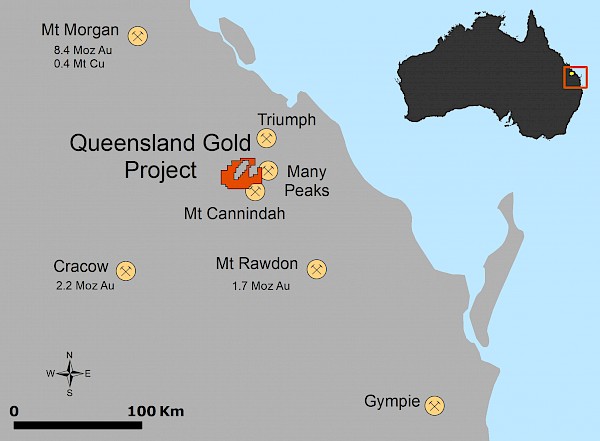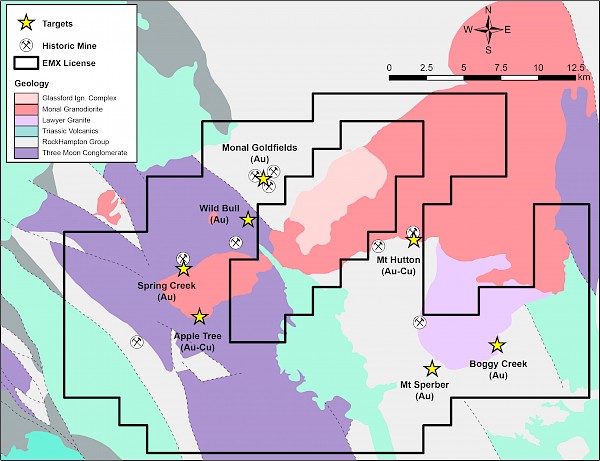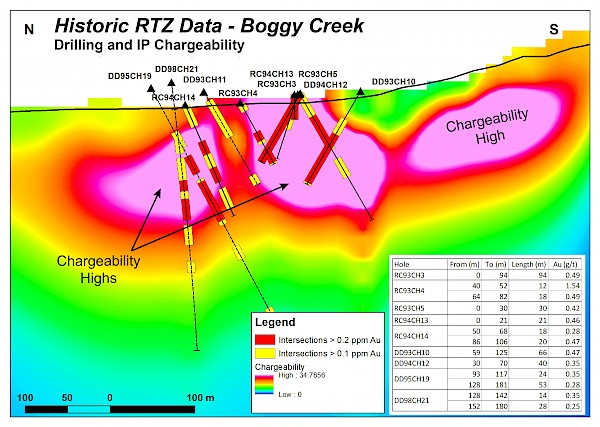Vancouver, British Columbia, August 27, 2019 (TSX Venture: EMX; NYSE American: EMX) – EMX Royalty Corporation (the “Company” or “EMX”) is pleased to provide an update regarding its ongoing exploration programs at the Queensland Gold project (the “Project”) in northeastern Australia. The Project is located in the Tasman Orogenic belt, which hosts significant gold mines and deposits, including Mount Leyshon, Cracow, Mount Morgan and Mount Rawdon (see Figure 1). The Queensland Gold property encompasses a 46,400 hectare area covering historic gold mines, gold occurrences, drill defined zones of gold mineralization, and multiple untested gold geochemical anomalies indicated by historic data sets.
The Project was acquired in stages between 2016 and 2019, prior to the recent rise in gold prices. Thus far in 2019, work completed by EMX includes 5.9 line-kilometers of induced polarization (IP) geophysical surveys and extensive surface sampling programs across multiple target areas on the property. This work follows up historic drilling by Rio Tinto Exploration Pty Limited (“RTZ”) that intersected long intervals of gold mineralization, as described below. The Project is 100% owned by EMX, and is available for partnership.
Project Overview. Queensland Gold represents one of EMX’s largest projects by area, and recent reconnaissance work integrated with a compilation of historic data sets has highlighted multiple zones of gold mineralization associated with suites of Permian-Triassic aged volcanic and intrusive rocks, as well as skarn and replacement styles of mineralization (see Figure 2). The styles of mineralization are similar to those seen at the nearby Mount Rawdon gold mine operated by Evolution Mining Ltd, and Metal Bank Ltd’s Triumph gold project. This region of Australia is known for its intrusion related gold systems (“IRGS”), which is a relatively new deposit type model that was commonly overlooked by historic regional assessment programs.
Historic Exploration and Mining. The Queensland Gold Project has been the site of historic mining and exploration activities for over a century. In the mid-1990’s, the Boggy Creek gold prospect was explored by RTZ, with work that included IP surveys and drilling that consisted of four diamond holes (“DD” prefix) and 17 reverse circulation (“RC” prefix) holes in areas of outcropping gold mineralization. Many of the historic RTZ drill holes intercepted long intervals (i.e., >25 meters) of gold mineralization associated with quartz vein stockworks in rhyolitic-dacitic intrusions, typical of IRGS systems. Highlights include hole RC93CH3, which was mineralized over its entire length as 94 meters averaging 0.49 g/t gold, and drill hole DD93CH10 which averaged 0.47 g/t over 66 meters (59-125m), ending in mineralization 1. Several other holes also ended in mineralization. For comparison, the average grades of current reserves (proven & probable) and resources (measured & indicated) at the nearby Mt. Rawdon Mine are 0.69 g/t gold and 0.62 g/t gold, respectively2.
Importantly, the gold mineralization is well correlated with chargeability highs from the IP surveys, a relationship that provides an effective tool for mapping prospective zones of mineralization (see Figure 3).
In terms of historic production, gold was discovered at Monal Creek in 1891, leading to the development of the Monal Goldfields in the northwest portion of the EMX license. This area is marked by historic shafts, adits, mine dumps and processing sites, where gold mineralization was present in multiple parallel quartz vein “reefs”. Eight parallel reef deposits were discovered and mined, and the mineralization appears to extend for several kilometers along strike. Records of historic production (1892-1930’s) are incomplete, but indicate that the grade of material processed by the mills averaged in the range of 24-32 g/t gold3. Based upon field observations and historic mapping, zones of sulfide-rich alteration and veining extend between the major reef deposits at Monal. However, more work is needed to better understand the distribution of mineralization in the area of the historic mines, and there are suggestions of lower grade material being present between the higher grade reef deposits. EMX considers this to be a high priority target for further exploration work and drilling.
2019 EMX Programs. EMX conducted additional IP surveys in March and April 2019 at the Boggy Creek prospect, which served to expand and extend the previously known IP chargeability anomalies associated with gold mineralization in the area. A total of 5.9 line-kilometers of 2D resistivity and chargeability data were acquired over five survey lines. The geophysical programs are being complimented by ongoing surface geochemical campaigns, including both rock chip and soil samples; assay results are pending. EMX considers the areas of high chargeability demarcated by the IP surveys to be high priority drill targets (refer to Figure 3).
In addition to the Monal and Boggy Creek targets, EMX has prioritized the Apple Tree prospect, which is a 1 kilometer by 2 kilometer topographic high in the western portion of the license that is ringed by stream sediment gold anomalies from historic surveys. Although highlighted by the historic data sets, the Apple Tree target has remained untested.
EMX is also working in the vicinity of Mount Hutton, where gold, copper and zinc mineralization is developed in skarns and replacement type zones. Results from EMX’s surface sampling programs in the Mount Hutton area are pending.
Plans for Further Exploration. Field work is ongoing, and planned to continue into late 2019. EMX’s Queensland Gold Project is available for partnership.
Comments on Exploration Results and Nearby Mines and Deposits. EMX’s reconnaissance geochemical sampling and geophysical surveys were conducted in accordance with industry best practice standards. EMX has not performed sufficient work to verify the Project’s historic drilling results or production data, but considers this information as reliable and relevant. The nearby mines and deposits in the region provide context for EMX’s Project, which occurs in a similar geologic setting, but this is not necessarily indicative that the Project hosts similar tonnages or grades of mineralization.
Dr. Eric P. Jensen, CPG, a Qualified Person as defined by National Instrument 43-101 and employee of the Company, has reviewed, verified and approved the disclosure of the technical information contained in this news release.
About EMX. EMX is a precious and base metals royalty company. EMX’s investors are provided with discovery, development, and commodity price optionality, while limiting exposure to risks inherent to operating companies. The Company’s common shares are listed on the TSX Venture Exchange and the NYSE American Exchange under the symbol EMX. Please see www.EMXroyalty.com for more information.
For further information contact:
David M. Cole
President and Chief Executive Officer
Phone: (303) 979-6666
Email: Dave@EMXroyalty.com
Scott Close
Director of Investor Relations
Phone: (303) 973-8585
Email:SClose@EMXroyalty.com
Neither the TSX Venture Exchange nor its Regulation Services Provider (as that term is defined in policies of the TSX Venture Exchange) accepts responsibility for the adequacy or accuracy of this release.
Forward-Looking Statements
This news release may contain “forward looking statements” that reflect the Company’s current expectations and projections about its future results. These forward-looking statements may include statements regarding perceived merits of properties, exploration results and budgets, mineral reserves and resource estimates, work programs, capital expenditures, timelines, strategic plans, market prices for precious and base metal, or other statements that are not statements of fact. When used in this news release, words such as “estimate,” “intend,” “expect,” “anticipate,” “will”, “believe”, “potential” and similar expressions are intended to identify forward-looking statements, which, by their very nature, are not guarantees of the Company’s future operational or financial performance, and are subject to risks and uncertainties and other factors that could cause the Company’s actual results, performance, prospects or opportunities to differ materially from those expressed in, or implied by, these forward-looking statements. These risks, uncertainties and factors may include, but are not limited to: unavailability of financing, failure to identify commercially viable mineral reserves, fluctuations in the market valuation for commodities, difficulties in obtaining required approvals for the development of a mineral project, increased regulatory compliance costs, expectations of project funding by joint venture partners and other factors.
Readers are cautioned not to place undue reliance on these forward-looking statements, which speak only as of the date of this news release or as of the date otherwise specifically indicated herein. Due to risks and uncertainties, including the risks and uncertainties identified in this news release, and other risk factors and forward-looking statements listed in the Company’s MD&A for the six month period that ended on June 30, 2019 (the “MD&A”), and the most recently filed Form 20-F for the year that ended on December 31, 2018, actual events may differ materially from current expectations. More information about the Company, including the MD&A, the 20-F and financial statements of the Company, is available on SEDAR at www.sedar.com and on the SEC’s EDGAR website at www.sec.gov.
Figure 1: Location Map of Queensland Gold Project

EMX’s land position is strategically located in the Tasman Orogenic belt in northeastern Australia. Evolution Mining has reported gold production from their Cracow (2.2 million oz) and Mt Rawdon (1.7 million oz) projects located ~100 km from the Queensland Gold Project4. Historic production from Mt Morgan totals 8.4 million ounces of gold and 0.4 million tonnes of copper5.
Figure 2: Geologic Map of the Queensland Gold Project

The Project encompasses an area of gold occurrences and prospects with historic mines, drilling, and untested gold anomalies.
Figure 3: Cross-section of Historic RTZ Drilling and IP Chargeability at Boggy Creek

Cross-section of historic drilling at Boggy Creek prospect. Mineralization from RTZ’s 1993 drilling is coincident with IP chargeability highs. True widths of drill intercepts unknown.
1 Historic drill results from “QDEX Report No. 26510”, ” QDEX Report No. 27444”, and ” QDEX Report No. 30549”, Geological Survey of Queensland. True widths are unknown.
2 Information for Mt Rawdon: JORC (2012) proven and probable reserves at a 0.3 g/t cutoff of 25.56 Mtonnes @ 0.69 g/t Au, and measured and indicated resources at a 0.2 g/t cutoff of 42.55 Mtonnes averaging 0.62 g/t Au, as detailed in “Mineral Resource and Reserve Statement - Dec 2018”, Evolution Mining Ltd website, accessed 2019/8/21, evolutionmining.com.au/reservesresources. Note that resources are inclusive of reserves.
3 Historic production grades from “QDEX Report CR22997”, Geological Survey of Queensland.
4 Mt Rawdon & Cracow historic production from Evolution Mining Ltd website, accessed 2019/8/23, evolutionmining.com.au/wp-content/uploads/2019/07/Cracow-fact-sheet-2019W.pdf and evolutionmining.com.au/wp-content/uploads/2019/07/Mt-Rawdon-fact-sheet-2019W.pdf.
5 Mt Morgan historic production from the Queensland Department of Mines and Energy “Mount Morgan Mine Rehabilitation Project” accessed 2019/8/23 (via web.archive.org/web/20110312161801) www.dme.qld.gov.au/zone_files/mt_morgan_pdf/ project_summary_mount_morgan_mine.pdf.
